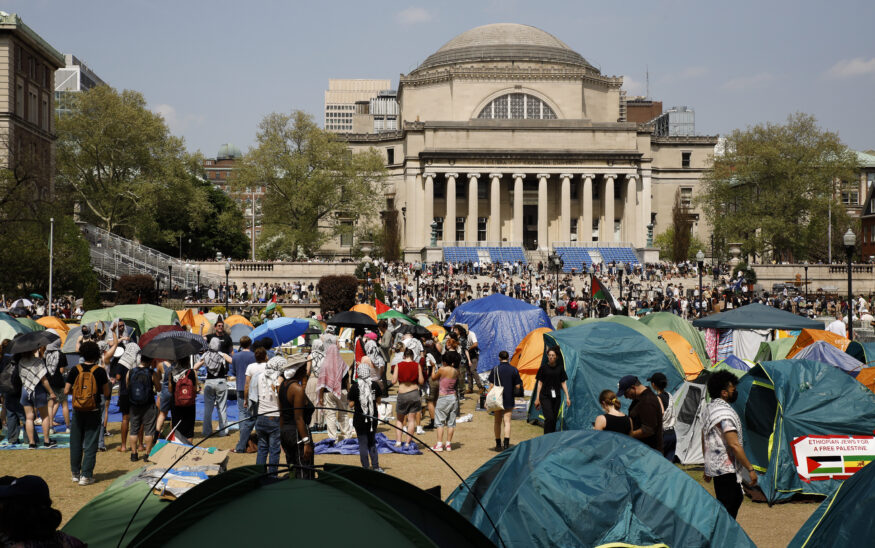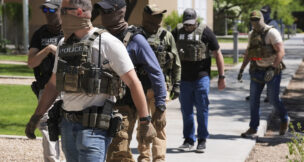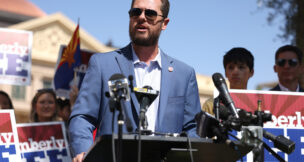New law prohibits overnight protests and encampments on Arizona campuses
Jamar Younger Arizona Capitol Times//October 3, 2025//
New law prohibits overnight protests and encampments on Arizona campuses
Jamar Younger Arizona Capitol Times//October 3, 2025//
Key Points:
-
New law bans overnight encampments on campus
-
Law was introduced in response to pro-Palestinian and anti-Israel protests last year
-
State university officials say current campus use policies align with the law
Activists and students who want to protest on campus will no longer be able to set up encampments and stay overnight.
A new law outlaws unauthorized encampments and directs university and community college presidents to immediately call for the dismantling of temporary shelters and to contact law enforcement if protesters don’t comply.
Failure to comply could result in a charge of criminal trespass.
The law also applies to encampments that remain in place for a prolonged period.
The legislation was introduced last session by Rep. Alma Hernandez, D-Tucson, as House Bill 2880 and signed into law by Democratic Gov. Katie Hobbs despite opposition from fellow Democrats.
Hernandez previously said she introduced the bill in response to the pro-Palestinian and anti-Israel protests last year, and talked about Jewish students facing harassment while on campus.
Democrats who opposed the measure pointed to examples of pro-Palestine protestors across the country receiving harassment, including those who’ve had their visas revoked for participating in protests.
Critics of the law argued that it could violate protesters’ First Amendment rights and expose them to targeted harassment based on their political beliefs.
“It really just feels like another form of weaponization and militarization on campus,” said Alberto Plantillas, central regional director for the Arizona Students’ Association and a graduate student at Arizona State University.
The majority of Republicans in the House and Senate supported the bill when it passed through the Legislature, although some expressed concern that conservative groups could be targeted under the law.
However, the legislators who supported the law said it was needed to protect Jewish students during what they viewed as a time of increased antisemitism.
Current state laws allow students and faculty to protest “within the limits of reasonable viewpoint and content-neutral restrictions on time, place and manner of expression.” Campus protesters are already prohibited from engaging in “unlawful” activities that disrupt the functioning of a university or college.
Spokespeople for the state’s three public universities highlighted existing campus policies that already aligned with the law.
The campus use policies for the three universities already ban encampments and offer guidelines for using public forums and outdoor activity space, erecting temporary structures, posting flyers, using campus spaces at night, and complying with university officials and law enforcement.
The University of Arizona’s campus use policy serves as a “mechanism” to support First Amendment rights, said university spokesman Mitch Zak.
“Our approach is that the dean of students office addresses any violations first and (the University of Arizona Police Department) is kind of a support should things escalate,” Zak said.
Zak said the university’s dean of students office aims to be proactive in preserving student First Amendment rights, and looks to work with student groups to make sure they don’t violate campus policies when they protest.
He recalled protests that occurred last year without any encampment issues.
“We’re constantly engaged saying we want to help you exercise your free speech on campus and the campus use policy is designed to do that,” he said. “That connectivity is critical so hopefully we’re not in a position where we have to enforce the campus use policy but … the campus use policy helps enforce opportunities for free speech.”
Plantillas said officials at the state’s universities haven’t appeared to be receptive to student input regarding protest policies and free speech issues.
“It seems like they continue isolating themselves from any student input on this,” he said.
Plantillas said he believes the crackdowns on campus protests and First Amendment violations will only continue to worsen.
“I think the students are just seeing this as a normalization process, but a lot of them have already seen the worst on campus,” he said. “I think that’s something that’s very disgraceful.”














































